Features | By Eve Lacroix
A civic university
Running sustainable challenges, advising on local policy, and rock climbing: how the City community is making positive change in Islington.
“From where I am standing in the Pavilion, we can see social housing through one window and a Georgian Square through the other,” remarked City’s President, Professor Sir Anthony Finkelstein, at a meeting for the Islington Anchor Institution Network (IAIN) in April 2023.
This opposing image epitomises Islington, a borough of both wealth and deprivation and where City has made its home for almost 130 years.
As an anchor institution within Islington, City is a large organisation whose long-term sustainability contributes to the wellbeing of the local population.
From academics contributing their knowledge, to professional staff connecting local schools to the University, colleagues across City are working to support our community.
Building partnerships within Islington
“City is a civic university, proud of its place in the Islington community and the role we play in local life,” said Dr Sionade Robinson, Vice-President (Enterprise, Engagement & Employability).

Acknowledging the disparities within the borough, the University takes its commitment to its community seriously. In 2022, City became a founding member of the IAIN alongside institutions such as Arsenal Football Club, Islington Council and the Whittington Health NHS Trust.
As part of the IAIN, City made three pledges:
- To better the borough by boosting jobs and employment within Islington
- To support local businesses within the borough through procurement
- To commit to achieving net zero carbon emissions by 2040.
The projects are being overseen by Kanan Barot, Assistant Vice-President (Civic Planning & Development). “The three pledges address areas of fundamental importance for improving the lives and wellbeing of our local community,” said Kanan. “These pledges could in turn also bring value to City through opportunities for recruitment, offering skills training, benefiting from better supply chains and helping to achieve net zero carbon emissions.”
Academic expertise to tackle local issues
Elsewhere at City, lecturers and researchers are using their academic knowledge to better the borough.
Dr Christian Reynolds, Reader in the Centre for Food Policy, is a global expert on food waste and sustainable diets. Christian has worked tirelessly to come up with solutions to reduce the environmental impact of the food supply chain.
He has worked with local councils and national bodies on projects including reducing plastic packaging, and creating a tool which calculates the climate benefits of plant-based diets.
His knowledge is being put to good use: in 2020, Christian joined the strategic board of the Islington Food Partnership, which is a coalition of local organisations and individuals working together to build a thriving local food system for the borough.
In this role, he advises on strategy, reviews documentation and suggests additional avenues the group can look into that would positively impact Islington’s food system.
“The network is a group of people who really care about food and Islington. We try to better the borough and practice what we preach at a local level.”
– Dr Christian Reynolds, Reader in the Centre for Food Policy
“Islington has done a good job at joining up food banks and emergency food provisions during Covid, but we are now also thinking about the circular economy and reducing the borough’s carbon footprint due to food delivery,” Christian added.
If you cannot see it, you cannot be it
“I have taught some children that have never seen the River Thames,” said schoolteacher and governor Sarah-Jane Kennedy, who works at Hugh Myddelton Primary School just north of City’s campus.
Hugh Myddelton is one of many schools that City’s Widening Participation and Outreach (WPO) Team works with. As an inner-city London school, its pupils come from a wide range of demographic backgrounds.
The WPO team’s goal is to help support underrepresented communities access higher education and thrive in their educational journeys, and colleagues work closely with each school to determine how to best support their needs.
Teacher Sarah-Jane identified that Year 6 schoolgirls would benefit from a final confidence boost before they head off to one of eight different secondary schools scattered across London.
She worked with Hannah Bowles, City’s Senior Outreach Officer, to come up with a week-long programme, called Girls Confidence Club.
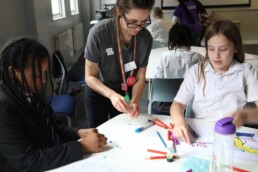
Throughout the week, the girls reflected on their strengths and the areas in which they wanted to grow skills. They took part in a range of activities, including drawing and crafting bracelets to give as gifts. They also toured City’s campus with undergraduate students to get an idea of what university is like.
On the final day of the programme, they went climbing at the Castle Climbing Centre.
Rock-climbing is an act of trust: the climber must trust their belayer to keep them safe if they fall off the route. Together, the girls built trust and pushed their limits, gaining confidence to try, to fail and fall, and to try again.
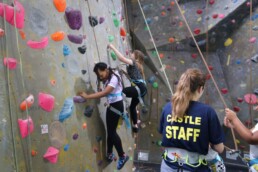
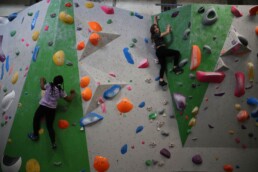
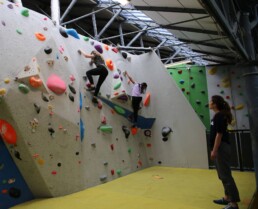
One 11-year-old student who took part in the programme dreams of being an author or an engineer. “This week taught me to appreciate the things I’m good at and to try and get better at the things I’m not good at,” she said.
Teacher Sarah-Jane was impressed with how confident and boisterous the girls were. Many of them who presented as very shy in school were keen to put themselves forward to try new things. “I love the fact that this programme focuses on the personal and social side as well as the educational angle,” she said.
“The girls have been coming back to school from these sessions energetic, happy, open-minded and bright-eyed.”
– Sarah-Jane Kennedy, Teacher at Hugh Myddelton Primary School
One of the goals of programmes like the Girls Confidence Club is for the girls to begin imagining themselves as future university students.
For some of these children, no-one in their family would have been to university, and visiting City gives them the chance to think about how school and university could impact their future.
“If you don’t see it, you struggle to be it,” says Ben Copsey, who heads up the WPO Team at City.
Inspiring next-generation journalists
Another way in which City is making a difference is through The News Clubs, a project which has seen pupils from five Islington Schools produce broadcast news programmes at the Department of Journalism’s TV studio.
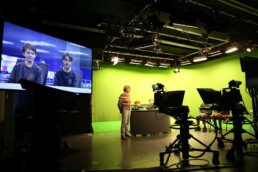
So far around 100 Islington children have taken part, sourcing stories, carrying out interviews and putting together broadcast pieces on serious local topics including teaching strikes and school closures.
The programme is delivered by Professor Emerita Lis Howell, a former broadcaster, who uses her professional experience to teach the schoolchildren about how the news is made.
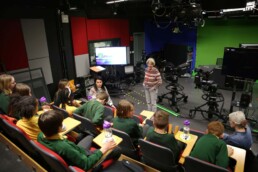
One group of children even had the opportunity to visit the ITN news studio, where Lis previously worked, before a news segment was filmed.
Felicity Djerehe, Headteacher at St Andrew’s Barnsbury Church of England Primary School, said the children are encouraged to think about the audience reading their creative writing pieces as they prepare to move onto secondary school.
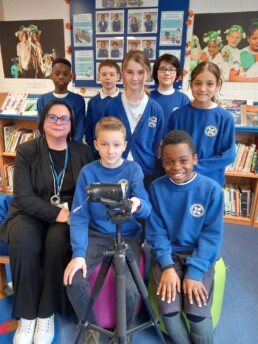
“Lots of the children have their own journals and write in them in the playground,” said Felicity. “This project has encouraged them to think of writing in other ways.”
Not only do the children become more confident in their English classes, but the News Club inspires them to think about what they might want to do with their lives.
“City’s outreach projects allow the children the opportunity to imagine new possibilities of where their life journey might take them,” added Ben Copsey.
Galvanising student activism through sustainability initiatives
Arthur Shearlaw, Sustainability Engagement Officer, is always thinking of new ways to galvanise the City community to become more involved in sustainability initiatives.
He collaborated with colleagues from City Ventures, the University’s entrepreneurship arm, and Better Space – a co-working space nurturing a community for social enterprise in Islington, to organise the first ever Sustainable City Hackathon.

The hackathon brought together City students and Islington residents, who teamed up to develop social enterprise ideas that would address sustainability issues within the borough.
The winning team came up with the idea of launching an affordable night-time grocery shop to cater to the night-time economy, which includes night owl students, shift workers and NHS staff. The runner-up team developed the idea of refurbishing tech products such as phones and laptops which could then be provided to children in the borough experiencing digital poverty.
A select group of students who took part in the hackathon then went on to take part in a Netherlands-wide university challenge based on the United Nation’s Sustainable Development Goals (also known as the Global Goals).
Student Jonathon Joseph Weldon, who is studying towards a master’s in data science, attended both the Islington and Netherlands challenges, and they have changed his perspective on how much positive change he is able to enact.
“It’s easy to sit back and think of sustainability problems as someone else’s to solve – but they’re not,” he said.
Students like Jonathon show that individuals can make a difference to the community. When you amplify that across an institution the size of City, then you really can create long and lasting change.
“City, University of London is a global university, but it is also a local university,” said Ben Copsey.
With students, staff and alumni working on bettering lives in their areas at a local level, a ripple effect of positive change is possible.